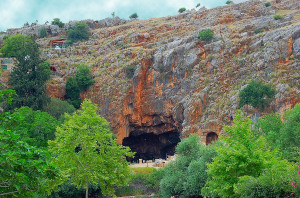Before heading south to Jerusalem for the last time, Jesus led his little band of Jewish followers about 25 miles north of their base around the Sea of Galilee to the region of Caesarea Philippi, a thoroughly Roman city at the foot of Mount Hermon. While there, as recorded in Greek in the Gospel of Matthew, Jesus said: “And I tell you that you are Peter (Petros) and on this rock (petra) I will build my church, and the gates of Hades will not overcome it.” For hundreds of years, theologians who have never seen where this claim was made have debated its theological meaning. A visit to Caesarea Philippi suggests that Jesus’ words were much more literal than many people recognize.
Caesarea Philippi was near an important pagan temple first established by the Greeks, who had built the city and called it “Paneas” in honor of their god Pan. The temple, important to both Greeks and Romans, surrounded a large opening in a natural rock wall more than 500 feet long and 100 feet high. The Greeks and Romans believed that this opening led directly to the damp and shadowy home of the dead the Greeks called Hades. To appease the potentially angry gods who lived in these nether regions, worshippers made sacrifices before idols residing in niches carved into the rock face near the literal “gates of Hades.”
Standing in front on the enormous rock wall near Caesarea Philippi, there is no mystery about either the rock or the gates of Hades that Jesus spoke about. The rock was the home of the pagan gods residing in the niches and the gates of Hades was the entrance to the dreaded realm of the dead.
Within 30 years of Jesus’ bold claim in front of this rock, churches had been established in his name throughout the lands of the gods of the Roman Empire. One of keys to this rapid growth of Christianity was its promise to overcome the dreary pagan view of an afterlife in Hades. Jesus’ famous statement at Caesarea Philippi seems to have been more prophetic than theological.
